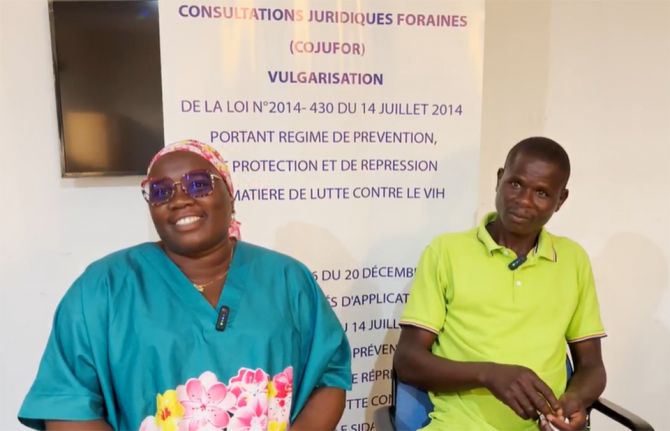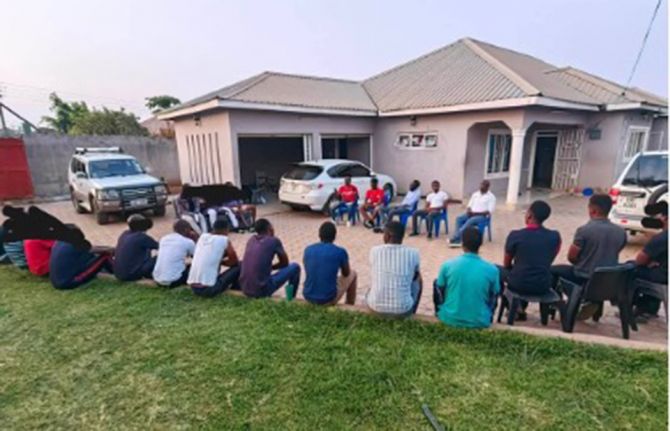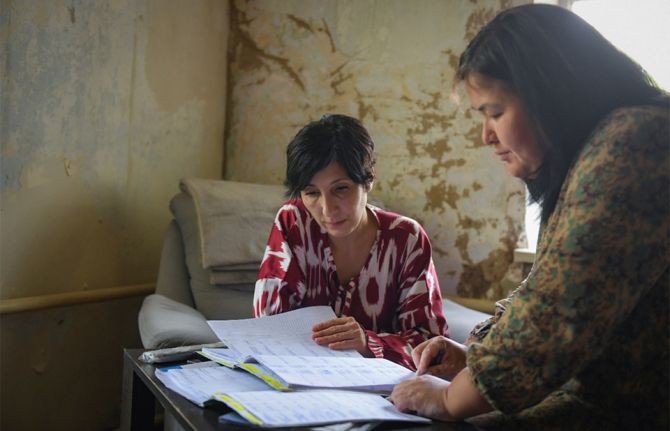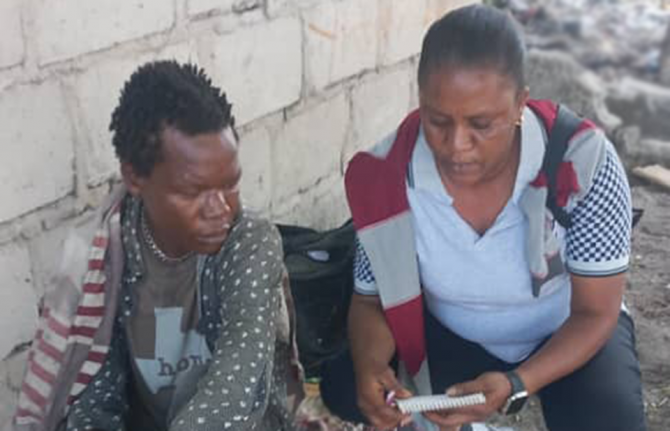


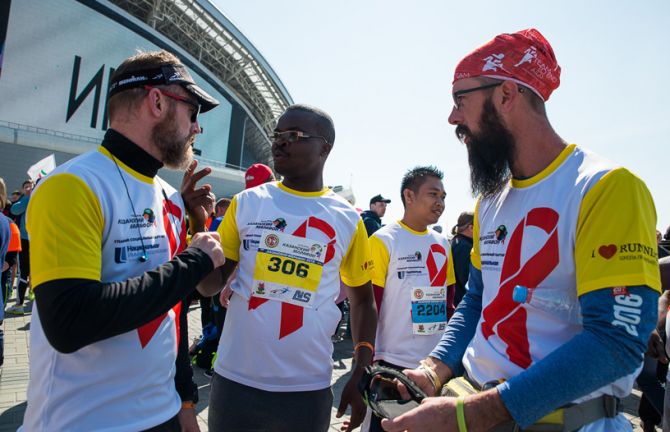
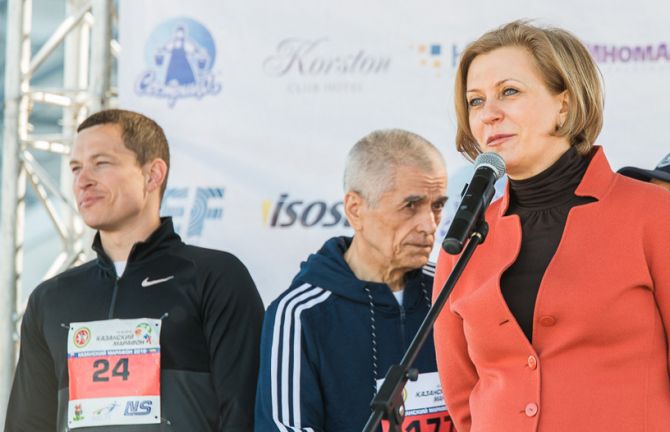
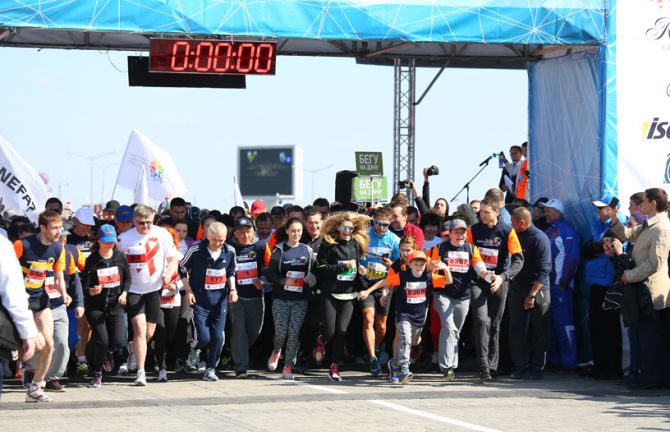
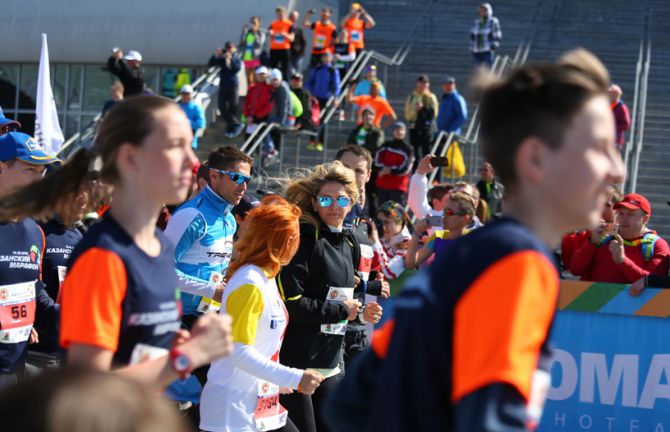
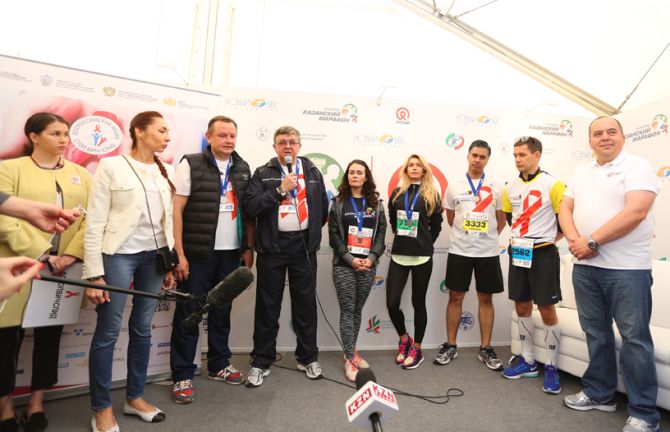
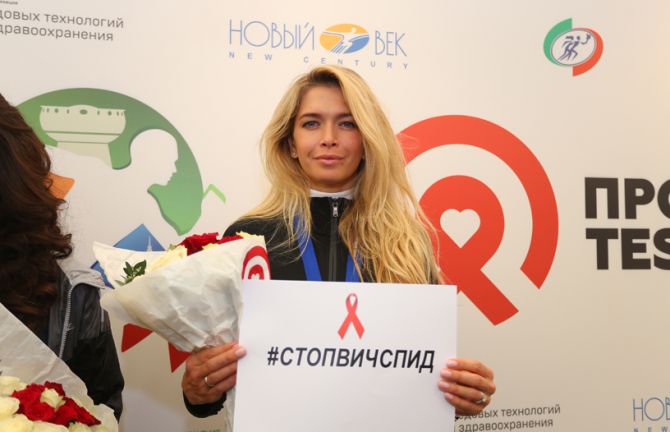
Update
Marathon runners commemorate International AIDS Candlelight Memorial in Kazan, Russian Federation
16 May 2016
16 May 2016 16 May 2016The Kazan Marathon, which commemorates the International AIDS Candlelight Memorial, took place on 15 May in Tatarstan, Russian Federation. Under the slogan “Test yourself!”, more than 9000 people had the opportunity to test their endurance and learn about their HIV status.
With support from the Government of Tatarstan, the Republican AIDS Centre and the New Century nongovernmental organization, runners accessed voluntary, rapid HIV testing at the marathon site.
For the first time in the Russian Federation, a large-scale sporting event was dedicated to HIV. The President of Tatarstan, Rustam Minnikhanov, was tested for HIV and called on all the marathon participants to follow his example. Gennady Onishchenko, Assistant to the Russian Prime Minister, Anna Popova, Head of Rospotrebnadzor, Sergey Kraevoi, Deputy Minister of Health, and Sergey Pospelov, Head of Rosmolodezh, came to Kazan from Moscow to support the event.
UNAIDS Goodwill Ambassador Vera Brezhneva ran 3 kilometres of the marathon route together with other participants, including more than 50 people living with HIV.
Quotes
“Today we remember those who have passed away due to AIDS-related illnesses. To date, over one million people in the Russian Federation have been diagnosed with HIV. Together we must ensure they can live normal lives.”
“I am grateful to the President of Tatarstan for his support to make the Kazan Marathon an annual event. Like a marathon, we cannot end AIDS with one step—this is a long road we have ahead of us, but we will get there by running together."
“HIV is no longer a death sentence. Today, people living with HIV can live a full and healthy life, if we diagnosed HIV early. But the first step is to get tested for HIV and to know your status.”
“The Kazan Marathon is living proof that if people living with HIV know their status, access quality HIV treatment and take care of their health, they can reach any milestone in life and in sport.”
“The Kazan Marathon is shining example of the power of partnership between government, businesses, nongovernmental organizations, the sports community and people living with HIV in Tatarstan.”
“Tatarstan has always been a leader among Russian regions, and is at the forefront of the HIV response. The Kazan Marathon is the start of the Fast-Track response to ending AIDS in the city of Kazan.”
Region/country
Related

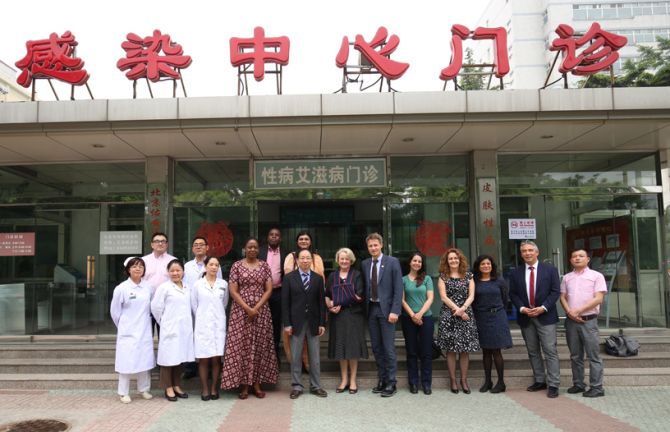
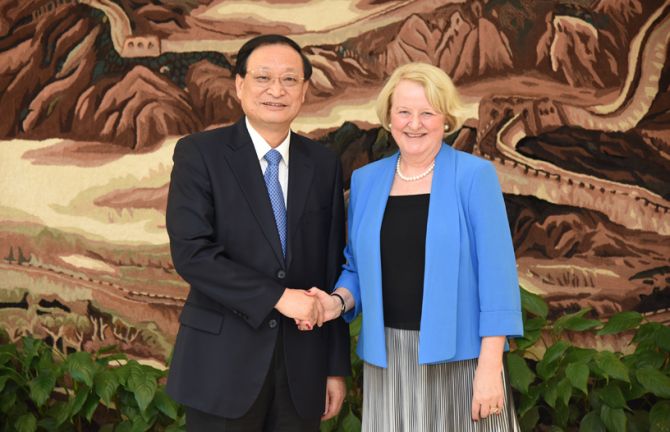
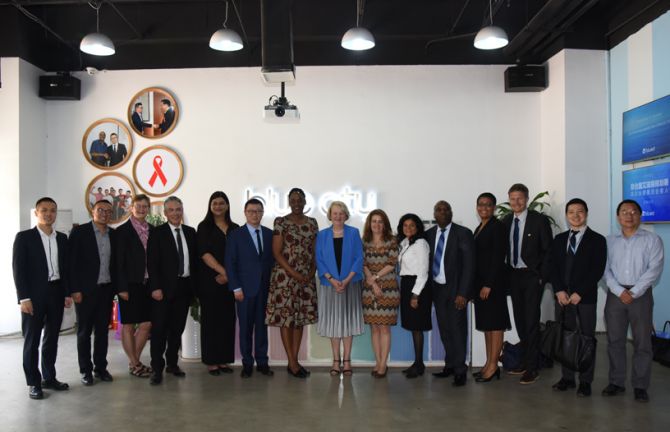
Update
Acceleration and innovation in China’s AIDS response
13 May 2016
13 May 2016 13 May 2016A delegation of the UNAIDS Programme Coordinating Board (PCB) visited China from 9 to 12 May to get insight into how the country’s national AIDS response is on the Fast-Track to end the epidemic as a public health threat by 2030.
The PCB delegation met representatives of the government, civil society and the private sector. Innovative and focused strategies, the engagement of non-traditional stakeholders, accelerated efforts and the importance of political leadership and advocacy on AIDS were identified as critical to Fast-Track the national AIDS response in China.
Confirming China’s commitment to the Sustainable Development Goal target of ending AIDS by 2030, the Vice-Minister of Health, Wang Guoqiang, emphasized China’s support for a strong Political Declaration on Ending AIDS at the United Nations General Assembly High-Level Meeting on Ending AIDS to be held in June. This would be an important driver for further acceleration of the AIDS response globally and in China.
China’s epidemic is concentrated among key populations at higher risk of HIV. Men who have sex with men, especially in major cities, are particularly vulnerable to HIV infection. HIV is prioritized at the highest levels of government and is addressed across sectors. The response is funded almost entirely from domestic resources.
“China’s leadership on HIV is an example of shared responsibility in action, with multisectoral approaches engaging the government, civil society and the private sector drawing on comprehensive national data,” said UNAIDS Deputy Executive Director Jan Beagle, who led the visit. “This can provide important lessons learned across continents, for South–South collaboration and particularly on sustainability,” she added.
Combining science, technology and community action for results
A variety of innovative approaches were showcased during the visit, including Beijing’s response to HIV. The city engages community-based organizations for enhanced service delivery. In addition, it has adopted a one-stop-shop model for HIV testing, has accelerated the test and treat strategy among men who have sex with men, has piloted HIV self-testing programmes and uses new technologies to support HIV prevention and treatment initiatives.
The PCB delegation made a site visit to Danlan, a nongovernmental organization advocating for lesbian, gay, bisexual and transgender rights. Danlan has combined a community-driven HIV prevention programme with a social enterprise scheme through social media—its dating application Blued, which has some 15 million users, includes links to HIV prevention and treatment services. The founder of Danlan, Geng Le, underlined how Blued provides an example of how combining science and technology can integrate the HIV response into the lives of people away from clinics and hospitals.
In discussions with the PCB delegation, members of Beijing’s Health and Family Planning Committee emphasized that their data are showing that community-based organizations, such as Danlan, have been particularly effective in carrying out rapid testing campaigns that reach communities at higher risk of infection. Although small in size, such campaigns have identified some 30% of all new HIV cases in the city.
The private sector’s role
The visit also focused on private sector engagement and action on AIDS within the Chinese national response.
The delegation met with the Red Ribbon Foundation, a national philanthropic fund comprising some 50 companies that are raising funds, providing materials and cooperating with the government on accelerating AIDS efforts.
Discussions with the China Chamber of Commerce for Import and Export of Medicines and Health Products (CCCMHPIE) focused on China’s support for the local production of medicines and health commodities in Africa. With the active engagement of UNAIDS, CCCMHPIE is engaging in technology transfer between Africa and China.
The PCB delegation included representatives of Burundi, Ecuador, El Salvador, Ghana, Norway and Switzerland, as well as the PCB nongovernmental organization delegation and UNAIDS Cosponsors. During the visit, the delegation met with a range of national partners, including representatives of the government at the national and city levels, the National AIDS Committee, civil society and community organizations, business leaders, health-care workers, development partners, media representatives and the United Nations Country Team. The delegation visited several sites in Beijing, where the team saw how the city has scaled up access to HIV prevention, testing and treatment services, including prevention of mother-to-child transmission of HIV and community-based responses.
Region/country

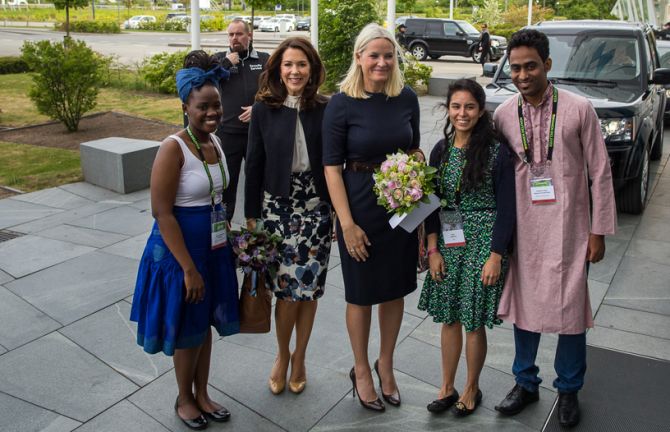
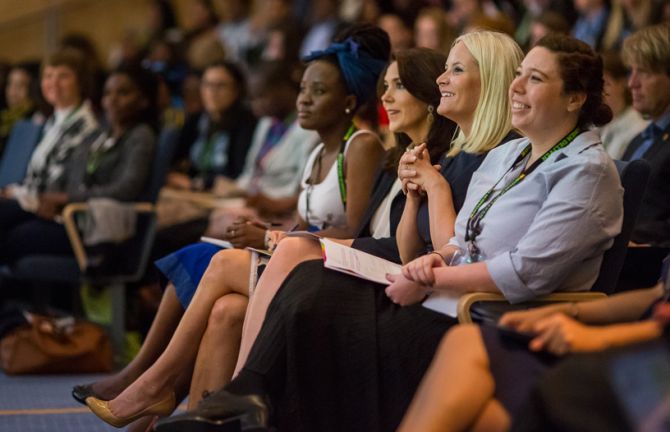
Update
Women Deliver: young women and adolescent girls crucial to ending the AIDS epidemic
16 May 2016
16 May 2016 16 May 2016At the Women Deliver youth pre-conference, taking place on 15 and 16 May in Copenhagen, Denmark, UNAIDS International Goodwill Ambassador Her Royal Highness Crown Princess Mette-Marit of Norway underlined the central role to be played by young women and adolescent girls in ending the AIDS epidemic by 2030.
Her Royal Highness stressed the need for young women and adolescent girls to take leadership roles in the AIDS response so that programmes and services could be developed to meet their specific needs and to ensure that their sexual and reproductive health and rights were respected.
Young women and girls remain disproportionately affected by HIV. In 2014, there were around 220 000 new HIV infections worldwide among adolescents aged 10 to 19, with adolescent girls accounting for 62% of new infections among this age group. In sub-Saharan Africa, adolescent girls aged 10 to 19 made up 72% of total new infections among this age group.
The Women Deliver youth pre-conference is a crucial opportunity for young activists in the HIV response to make their voices heard in the lead-up to the United Nations General Assembly High-Level Meeting on Ending AIDS, which will take place in New York, United States of America, from 8 to 10 June. It is also a chance for hundreds of young activist to take stock of programmes such as the All In initiative to #EndadolescentAIDS and to outline ways forward to ensure a greater youth participation in development.
The Crown Princess has been involved in the AIDS response since 2003 and is a powerful advocate for youth engagement and the empowerment of women. The Crown Princess recently visited the United Republic of Tanzania to assess progress made in eliminating mother-to-child transmission of HIV and to see how young people were engaging in the AIDS response.
Quotes
“I truly believe engaged youth is key. Key to managing and resolving the challenges we face in relation to HIV. But moreover, the voice of youth is key to understanding and resolving most of the challenges we are facing in the world today. Your tenacity, your knowledge and your world view is needed, and deserve to be heard loudly in the corridors of power.”
“Ensuring that women and girls are empowered to protect themselves from HIV, to make decisions about their own health and to live free of violence, including violence related to their HIV status, will be crucial to ending the AIDS epidemic by 2030.”

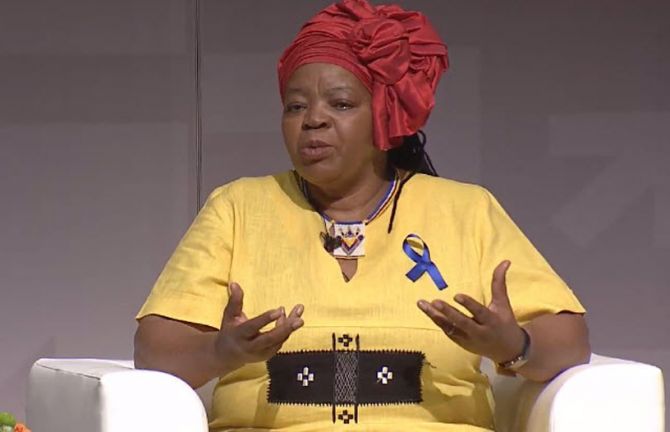
Update
Towards an AIDS-free generation
19 May 2016
19 May 2016 19 May 2016On 17 May, UNAIDS and the World Health Organization (WHO) convened a panel discussion on the progress made and challenges in eliminating new HIV infections among children and ensuring the health and well-being of mothers. UNAIDS and WHO joined together at the Women Deliver conference, taking place in Copenhagen, Denmark, to amplify the message that access to HIV services and promoting sexual and reproductive health and rights are inextricably linked.
The session highlighted the successes to date of the global HIV response for women and children, including the 77% coverage of pregnant women living with HIV in 2014 receiving antiretroviral medicines to stop transmission of HIV to their child, an increase from the 37% coverage in 2009. The right of women to have children, the right to information on how to protect themselves from HIV and the right to HIV treatment were reinforced by the panellists. How to provide HIV treatment as part of the Sustainable Development Goals and in the context of the changing political and funding environments affecting donor priorities was also discussed.
The Director of the UNAIDS Regional Support Team for Eastern and Southern Africa, Sheila Tlou, opened the panel discussion, which was moderated by Geeta Rao Gupta, Deputy Executive Director of the United Nations Children’s Fund. UNAIDS Goodwill Ambassador Annie Lennox spoke at the event, which also featured Annah Sango, a young mother and youth activist living with HIV, Kenly Sikwese, an advocate and father living with HIV, and Felicitas Zawaira of the WHO regional office in Brazzaville, Congo.
Quotes
“The world has a golden opportunity to remove an agonizing experience for many women—the risk of transmitting HIV to a child. By working together and ensuring access to antiretroviral medicines, we can empower women with one more tool towards achieving their full reproductive health rights.”
“We have come a long way and made historic progress. But AIDS is not over. The Sustainable Development Goals provide an important opportunity to renew our commitment and to finish the unfinished business of protecting women, children and families from HIV, and providing treatment to all who need it.”

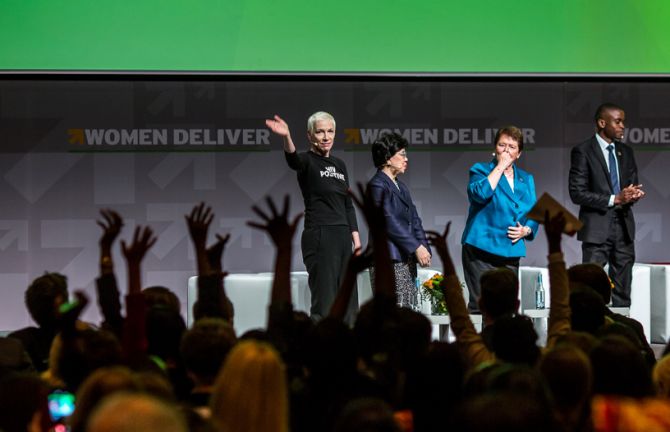
Update
Women Deliver: ensuring a development agenda for women and girls
17 May 2016
17 May 2016 17 May 2016UNAIDS International Goodwill Ambassador Annie Lennox galvanized participants at the opening of the Women Deliver conference, which is taking place in Copenhagen, Denmark, from 16 to 19 May. Ms Lennox said that women had to break down the structures that cemented gender inequality and end all forms of gender-based violence. Her speech electrified the more than 5000 delegates taking part in the conference, which is the world’s largest global conference on the health, rights, and well-being of girls and women to take place in the past decade.
The 2016 Women Deliver conference is being held under the theme of “Implement the Sustainable Development Goals so they matter most for girls and women.” The conference has a special focus on health, and in particular maternal, sexual and reproductive health and rights. Other themes include gender equality, education, the environment and economic empowerment.
The agenda of Women Deliver is central to the UNAIDS Fast-Track approach which calls for action on women’s empowerment and the advancement of sexual and reproductive health and rights in order to end the AIDS epidemic.
Other speakers at the opening ceremony included Her Royal Highness Princess Mary of Denmark, Jill Sheffield, the Chief Executive Officer and President of Women Deliver, Babatunde Osotimehin, Executive Director of the United Nations Population Fund, Gro Harlem Brundtland, the former Prime Minister of Norway, Margaret Chan, Director-General of the World Health Organization, and the journalist, human rights activist and Nobel Prize laureate, Tawakkol Karman.
Quotes
“Ending the AIDS epidemic requires a unified response in tackling the deepest roots of social injustice. To succeed, we must break down structures of gender inequality, we must dismantle notions of patriarchy and we must end all forms of gender-based violence.”
Related
 “Who will protect our young people?”
“Who will protect our young people?”

02 June 2025


Update
UNAIDS fundraising gala to increase access to HIV services for women and children
04 May 2016
04 May 2016 04 May 2016UNAIDS, in collaboration with the Hotel InterContinental Geneva, Cartier and Design Miami, is organizing a fundraising gala to take place on 13 June during the Art Basel week in Basel, Switzerland.
The gala will aim to raise funds to increase access to HIV prevention and treatment services for women and children worldwide. Hosted by Her Royal Highness Princess Eugenie of York, Caroline Rupert, Kweku Mandela and Ndaba Mandela, the event will honor H.E. Kofi Annan.
This year’s gala will feature a live performance by Duran Duran and an exclusive design auction—a first for Art Basel—boasting one-of-a-kind contributions by the world’s best designers. It will be led and curated by Simon de Pury and Design Miami, who have enlisted a roll call of who’s who in the design world in support of UNAIDS. The dinner will be punctuated by a special reading of “Shadows” by Keanu Reeves, based on his collaboration with artist Alexandra Grant.
Tickets to participate can be purchased here.
In 2015, the UNAIDS gala in Geneva raised funds to stop new HIV infections among children through donations from people in attendance and a live auction of fine jewellery and art. The event was part of the UNAIDS and Hotel InterContinental Geneva “Where history is made” public–private partnership, which started in 2013 to advance global efforts to ensure that all children are born free from HIV, that their mothers have access to life-saving medicines and that all children living with HIV can lead healthy lives.
UNAIDS GALA 2016
Where history is made
Monday, 13 June 2016
Basel, Switzerland, during Art Basel week
Hosts
Her Royal Highness Princess Eugenie of York
Caroline Rupert
Ndaba Mandela
Kweku Mandela
Honouring
Kofi Annan
Live performance
Duran Duran
Underwriters
Craig Robins, René Kamm
Event chairs Diane Ackerman, Alia Al-Senussi, Robbie Antonio, Criselda Breene, Vera Brezhneva, Barbara Bulletti Newman, Naomi Campbell, Becca Cason Thrash, Andrea Crane, Silvia Cubiñá, Alexandra Grant, Patricia Kamp, Samallie Kiyingi, Ekaterina Luki, JJ Martin, Olivier Martinez, Jennifer McCrea, John Melick, Yossi Milo, Karline Moeller, Martina Mondadori, Mon Muellerschoen, Rodman Primack, Keanu Reeves, Thabo Sefolosha, Tatiana Silva, Franca Sozzani, Swoon, Jamie Tisch, Marlies Verhoeven Reijtenbagh
Honorary chairs Thorsten Albertz, Timea Bacsinszky, Victoria Beckham, Klaus Biesenbach, Peter and Stephanie Brant, Mr. Brainwash, James Chau, Eva Chow, Michael Chow, Francisco Costa, Wade Guyton, Lenny Kravitz, Doutzen Kroes, Jude Law, Vik Muniz, Behati Prinsloo, Nico & Vinz, Aishwarya Rai Bachchan, Aby Rosen, Ed Ruscha, Cindy Sherman, Patrick Stewart, Charlize Theron, Francesco Vezzoli, Naomi Watts
Auctioneer
Simon de Pury
Time
19:30: exclusive Design Miami vernissage exhibition, cocktails and red carpet
21:00: dinner, design auction and special musical performance
22:30: after-party
Location
Halle 1.2, Messe Basel, Switzerland
Made Possible by Cartier
With the support of Design Miami
In partnership with InterContinental Hotel Genève
TABLES/TICKETS
Click here to purchase tickets online
CONTACT FOR EVENT INFORMATION, TICKETS AND TABLE INQUIRIES
Josh Wood Productions at +1 646 652 5814 or gala@unaids.org
CONTACT FOR PRESS INQUIRIES Blue Medium at +1 212 675 1800 or mathilde@bluemedium.com

Update
UNAIDS and Sierra Leone — Country update
02 May 2016
02 May 2016 02 May 2016http://www.unaids.org/en/resources/documents/2016/country_profile_Sierra-Leone
Region/country
Related

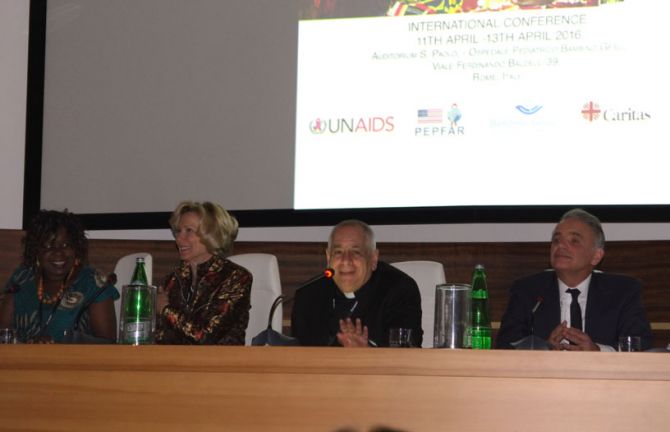
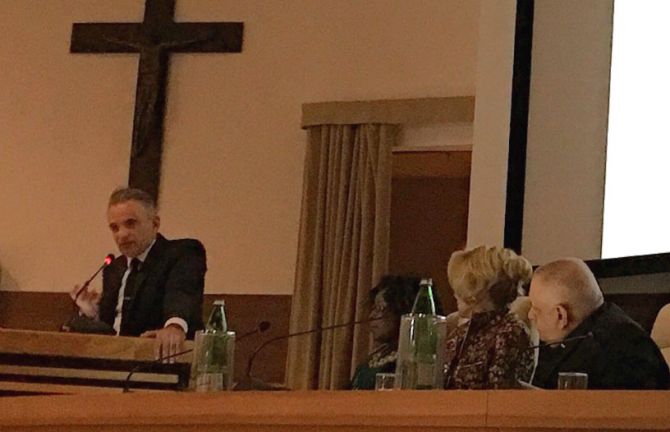
Update
Vatican meetings urge accelerated access to HIV testing and treatment for children
19 April 2016
19 April 2016 19 April 2016Caritas Internationalis recently brought together global partners in two events to discuss the role of faith-based organizations and the private sector in closing the global HIV testing and treatment gap for children living with HIV. The meetings, held in the Vatican City from 11 to 15 April, were co-organized with UNAIDS, the United States President’s Emergency Plan for AIDS Relief (PEPFAR) and the Vatican’s Bambino Gesù paediatric hospital.
Cardinal Peter Turkson, President of the Pontifical Council for Justice and Peace, hosted and opened a high-level meeting with representatives of the private sector, including pharmaceutical and diagnostics companies, faith-based organizations responding to HIV, people living with HIV, national governments, the United Nations and the Global Fund to Fight AIDS, Tuberculosis and Malaria.
In his opening remarks to the meeting, the Cardinal drew from Pope Francis’ pastoral letter to the world (the encyclical Laudato si’). In the letter, the Pope challenges the world to take renewed and coordinated action against factors that result in the deterioration of the natural and social environment, such as climate change, pandemics, poverty, conflict and violence.
In a separate statement, Pope Francis specifically called on the meeting participants to find “new possibilities of providing greater access to life-saving diagnosis and treatment” for children. At the end of the meeting, the participants committed themselves to find collective solutions, such as multipartner agreements to encourage more research on HIV treatment for children, to accelerate the process of testing, approving and registering new HIV medicines for children, to find innovative solutions to prevent medicine and supply stock-outs and to strengthen health system. The participants agreed to reconvene in order to finalize a road map to improve access to HIV treatment for all.
In a separate three-day consultation on paediatric HIV, the participants debated and agreed upon the most urgent actions needed to strengthen equitable access to testing and treatment for children living with HIV. That event was attended by more than 80 participants, mainly from sub-Saharan Africa, but also from countries as far afield as Armenia, Colombia, India and Viet Nam, as well as representatives of national and multilateral agencies.
Deborah Birx, PEPFAR Global AIDS Coordinator, and Luiz Loures, Deputy Executive Director of UNAIDS, presented to the consultation an overview of the state of the HIV epidemic among children and the global response to date. Discussions focused on the current challenges in reaching children with HIV testing and treatment.
In order to end the AIDS epidemic by 2030, it was agreed that there is an urgent need to Fast-Track access to HIV testing, prevention and care services and treatment for all. Attention was given to the central role played by faith-based organizations in the delivery of community-based HIV and other health services to children and their extended families. Such organizations can often reach the populations that are in greatest need but that have the poorest access to HIV services.
Caritas Internationalis will present the recommendations of the three-day consultation to the United Nations General Assembly High-Level Meeting on Ending AIDS, to be held in New York, United States of America, from 8 to 10 June.
Quotes
“Let it (the dialogue) continue until we find the will, the technical expertise, the resources and the methods that provide access to diagnosis and treatment available to all, and not simply to a privileged few for … there is no human life that is qualitatively more significant than another.”
“Despite tremendous global progress, many challenge remain, particularly in low- and middle- income countries, but also among poor and marginalized populations in high-income countries. Babies are still being born with HIV, adults and children cannot access the second- and third-line HIV medicines they need, and health infrastructure often lacks basic services, such as water and electricity. We must all be part of the story and part of the solution to delivering accessible, affordable care for our vulnerable brothers and sisters.”
“Faith-based organizations were there long before the United States President’s Emergency Plan for AIDS Relief and the Global Fund to Fight AIDS, Tuberculosis and Malaria. They have much to teach us as they are at the forefront of innovative and alternative service delivery models.”
“Faith-based organizations have led the way in reducing new infections among children, and are now leading the way to ensure that all children with HIV receive treatment.”
“Science has gone far, but we have not yet been able to link all people to the latest advances. Success without equity is not success. Faith-based organizations can provide the link between people and science, and ensure that services are delivered equitably to all.”
Related
 Government ensures continuity of treatment in Malawi
Government ensures continuity of treatment in Malawi

10 February 2025

Update
UNAIDS welcomes First Lady of Côte d’Ivoire to UNAIDS headquarters
26 April 2016
26 April 2016 26 April 2016The Executive Director of UNAIDS, Michel Sidibé, welcomed the First Lady of Côte d’Ivoire, Dominique Ouattara, to UNAIDS headquarters on 25 April. During their meeting, they reviewed the substantial progress made in stopping new HIV infections among children in Côte d’Ivoire. More than 80% of pregnant women living with HIV in Côte d’Ivoire have access to antiretroviral therapy, up from 48% in 2009, and new infections among children have dropped by 26% since 2009.
In December 2014, Mr Sidibé presented Ms Ouattara with the title of UNAIDS Special Ambassador for the Elimination of Mother-to-Child Transmission and the Promotion of Paediatric Treatment for HIV for her humanitarian work and her commitment to improving access to paediatric treatment for children living with HIV.
During her visit to UNAIDS, Mr Sidibé commended the First Lady’s work in raising awareness around HIV in western and central Africa. He also outlined the importance of focusing on women, children and adolescents in cities, particularly in Abidjan, the capital of Côte d’Ivoire, where more than one third of all people living with HIV in the country live.
Ms Ouattara, a long-time humanitarian activist, conveyed her thanks to UNAIDS and reiterated her commitment to focus on early paediatric diagnosis, treatment and education and on achieving zero discrimination.
Quotes
“I thank you for the very productive meetings as well as your guidance, all in the interest of reaching our common goal—to halt and end the AIDS epidemic in Côte d’Ivoire.”
“Côte d’Ivoire has made tremendous progress in eliminating mother-to-child HIV transmission of HIV, leading the way to ending the AIDS epidemic by 2030 and highlighting the importance of political will.”
Region/country
Related

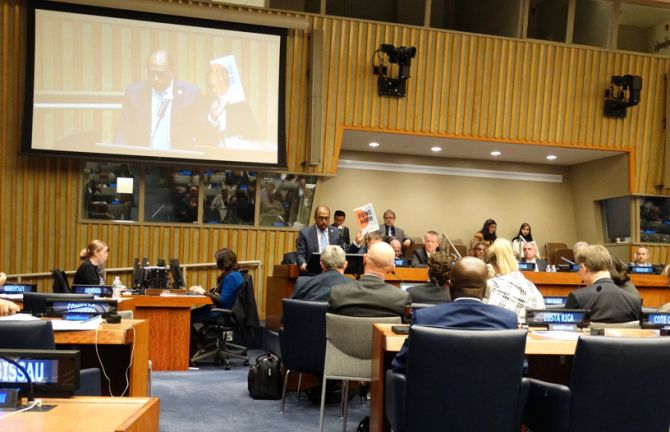
Update
Protecting the health and human rights of people who use drugs
20 April 2016
20 April 2016 20 April 2016The UNAIDS Executive Director, Michel Sidibé, has taken part in a round-table meeting on demand reduction and health-related measures at the United Nations General Assembly Special Session on the World Drug Problem, taking place in New York, United States of America, from 19 to 21 April.
Mr Sidibé said that after 40 years of a repressive response towards people who use drugs it is time to transition towards a more comprehensive health- and human rights-based approach. He added that the world is failing to protect the health and human rights of people who use drugs.
Referring to a new UNAIDS report, Do no harm: health, human rights and people who use drugs, he pointed out that the world had missed the United Nations General Assembly’s target set in 2011 to reduce HIV transmission among people who inject drugs by 50% by 2015.
Mr Sidibé noted that insufficient coverage of harm reduction programmes and policies that criminalize and marginalize people who inject drugs are failing to reduce new HIV infections. He stressed that a more pragmatic approach was necessary, because the world would never be free from drugs.
Other speakers at the round-table meeting included Svatopluk Němeček, the Czech Republic’s Minister of Health, Bernt Hoie, Norway’s Minister of Health and Care Services, K. Shanmugham, Singapore’s Minister for Home Affairs and Law, and Lamine Touré, of the Senegalese nongovernmental organization Sopi Jikko.
Most speakers backed Mr Sidibé’s call for more harm reduction coverage for people who use drugs, although Mr Shanmugham said law enforcement approaches had worked to deter drug use in Singapore. He said he was impressed by harm reduction programmes offered by countries such as the Czech Republic and Norway, but that much depended on the cultural context.
Mr Němeček said the Czech Republic had achieved better health outcomes by decriminalizing drug use and increasing harm reduction coverage and voluntary programmes to treat drug dependence.
Quotes
“We need a people-centred approach that restores dignity to people who use drugs, which brings them out of the shadows and into services; an approach that is focused on the health and rights of every individual and that ensures that no one is left behind.”














